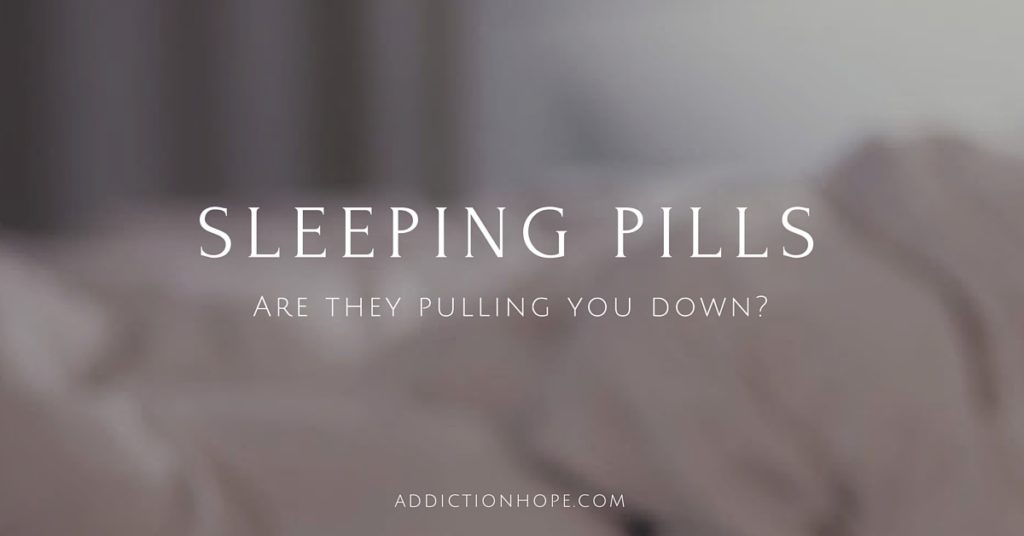
Contributed by Jennifer Tokar, CCAC, writer for Addiction Hope.
The process of weaning off sleeping medications should never be done without the aid and support of a medical professional, whether prescribed by a doctor or otherwise. A person wishing to wean themselves from this medication should first speak with a medical professional and follow his or her advice.
Some people are under the impression that sleeping medications are not addictive and that, due to being prescribed by their doctor, they are always safe. Studies have shown that sleeping medications should be used in moderation and for short periods of time, due to their high risk of dependence and the difficulty weaning off them. [1]
Many sleeping medications belong to the benzodiazepine and barbiturate family. The reduction of and eventual abstinence from these drugs need to be monitored by a health professional. Benzodiazepines and barbiturates fall under the Central Nervous System (CNS) depressant classification. Essentially, they slow down the CNS. [2]
Sleep medications have shown to impair memory and psychomotor functioning. Dependence on them can increase anxiety at the thought of no longer taking the medication. Thus, a drug-seeking behavior can develop. [3]
Finding The Cause Of Insomnia And Addressing It
When you are attempting to reduce or abstain from sleeping medication, understanding the root cause of your insomnia and the need to use sleeping medication is often very helpful and can allow your therapist or doctor develop a lasting reduction/abstinence plan. Studies have shown that treating adjustment sleep disorders and psychophysiological sleep disorders can be effective with behavioral approaches. [4]
Developing and maintaining a good bedtime routine is a type of behavioral strategy that includes:
- Going to sleep at the same time every night
- Reducing caffeine and alcohol use
- Not engaging in strenuous exercise right before bed
- Shutting off electronics before getting into bed
- Considering relaxation techniques prior to bedtime
This is where counseling and behavioral therapies will play a key role in the reduction and abstinence of sleeping pills. Addiction is a serious concern that can be both psychological and physical in nature, and it can impact every area of your life. The physiological addiction to sleeping pills could be tapered with your doctor’s help to avoid rebound insomnia. Your doctor may do this through introducing a new medication along with your current medication.
Going To Sleep Naturally To Break Sleeping Pill Addiction
First off, prepare yourself for the thought of not taking a pill every night to go to sleep. Remember: There was a likely a time you did not need a pill to sleep. Keeping track of your activities prior to sleep as well as how well you sleep each night can help you start the process of weening off your medications.
The help and support of an addiction specialist can assist you in exploring any ambivalence you may have as well as patterns you yourself may not recognize. This would be especially important if you have struggled with addiction to other substances in the past or are currently using other substances while on sleeping pills.
Mentally Prepare Yourself
Often insomnia is your body’s response to an underlying issue that can be medical, trauma-related or even due to poly-substance use. You need to believe that you have the ability to fall asleep on your own and stay asleep. Everyone needs a different amount of sleep, and getting to know your sleep requirements will help with your abstinence from sleep medications.
You need to be honest with yourself and ask, “Am I ready?” And if the answer is, “No, not really,” explore the “why” with your medical professionals.
‘Sleep Hygiene’ Tips
Taking a bath with salts may help with relaxation at the end of the day, as can drinking herbal tea. Remember not to eat prior to bed. Late-shift workers can find regular sleep hygiene especially difficult, but ensuring you are keeping the same sleep routine is imperative.
Other steps to good sleep hygiene [1, 4]:
- Avoid taking a nap during non-sleeping hours.
- Get adequate light exposure.
- Associate your bed with sleep, rather than texting or TV watching.
- Do not be a clock watcher. Staring at the clock can increase stress.
- Perform bedtime relaxation techniques, including abdominal breathing exercises or muscle relaxation.
It is important to stay positive through this process and remember that nothing is an easy fix. But with dedication and support, you will reach your goals. A positive attitude and some self-affirmation can go a long way!
Community Discussion: Share Your Thoughts Below
Have you utilized alternative and healthy practices to go to sleep naturally? What works well for you? Please share your story in the comment section below.
 About the Author: Jennifer Tokar CCAC, is a Canadian Certified Addiction Counselor and has been working in the field of addiction and mental health in a variety of capacities for 17 years. Jennifer feels a strong passion to give back and has engaged in many volunteer opportunities over the years, including sitting on a steering committee that organizes a yearly family violence conference as well as sitting on the board of governors of a nonprofit organization.
About the Author: Jennifer Tokar CCAC, is a Canadian Certified Addiction Counselor and has been working in the field of addiction and mental health in a variety of capacities for 17 years. Jennifer feels a strong passion to give back and has engaged in many volunteer opportunities over the years, including sitting on a steering committee that organizes a yearly family violence conference as well as sitting on the board of governors of a nonprofit organization.
Jennifer ensures she stays up to date and current with best practices in the field of addiction counseling by attending various training sessions and conferences throughout the year. Currently, Jennifer is working towards her Bachelor of Social Work as well as her Clinical Traumatologist Certification. Jennifer has been in recovery from heroin and cocaine addiction for the past 19 years and this has afforded her a perspective not available to some when working with a newly recovering addict.
References:
[1]: U.S. National Library of Medicine. (2013, November 6). Using medication: What can help when trying to stop taking sleeping pills and sedatives? Retrieved from http://www.ncbi.nlm.nih.gov/pubmedhealth/PMH0072626/
[2]: US Department of Health and Human Services. (2014). Research report series: Prescription drug abuse (15-4881). Retrieved from National Institute of Drug Abuse website: https://www.drugabuse.gov/sites/default/files/prescriptiondrugrrs_11_14.pdf
[3]: Longo, L. P., & Johnson, B. R. I. A. N. (2000). Addiction: Part I. Benzodiazepines-side effects, abuse risk and alternatives. American family physician, 61(7), 2121-2128.Retrieved March 21, 2016, from: http://www.aafp.org/afp/2000/0401/p2121.html
[4]: Doghramji, K. (2006). When patients can’t sleep: Updated guide to workup and hypnotic therapy. Current Psychiatry, 5(1), 49.
